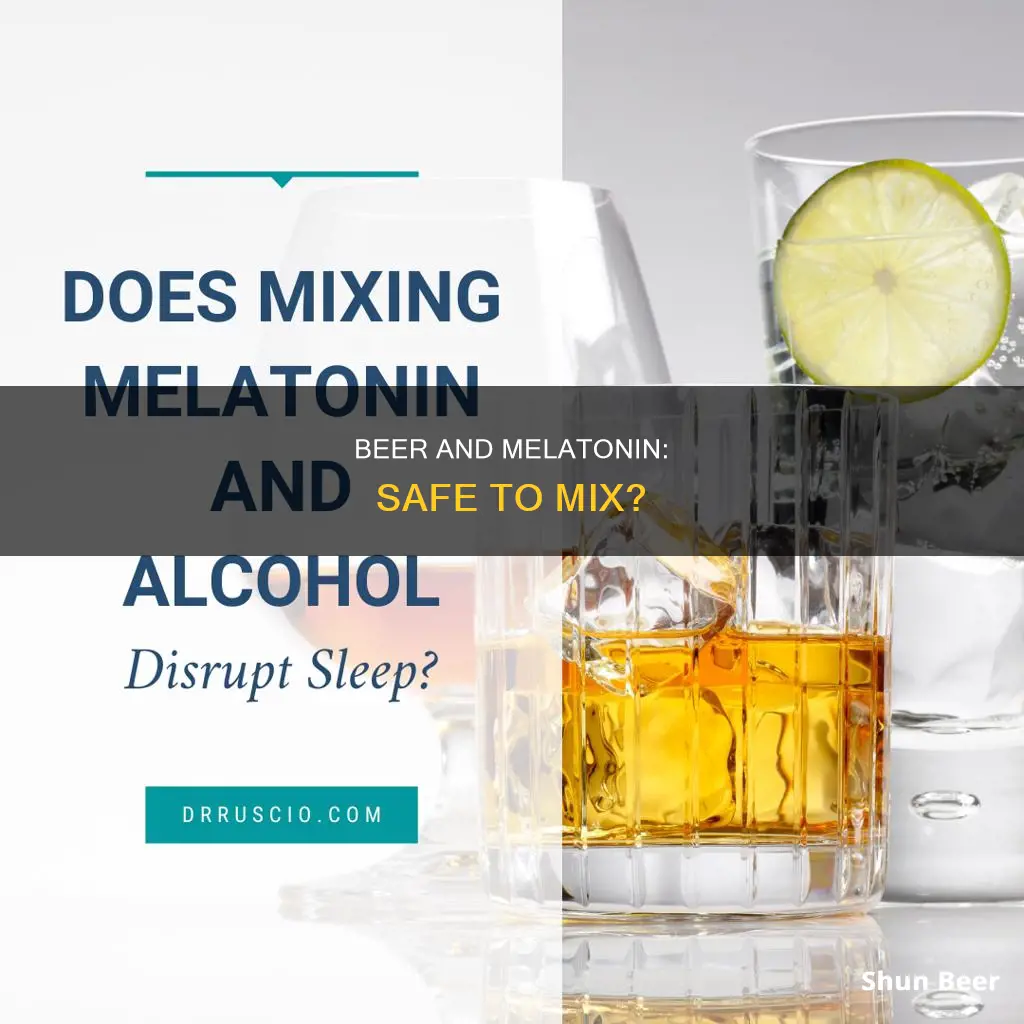
Drinking alcohol and taking melatonin is not recommended. Both alcohol and melatonin are sedatives, so mixing them can lead to more severe sleepiness, which can be dangerous if you need to drive or operate machinery. Alcohol can also disrupt your sleep-wake cycle, counteracting the effects of melatonin and making it harder for it to work.
| Characteristics | Values |
|---|---|
| Should you take melatonin after drinking beer? | No, it is not recommended to mix alcohol and melatonin |
| Why? | Alcohol disrupts your sleep-wake cycle, while melatonin promotes it. |
| What are the risks? | Increased drowsiness, dizziness, anxiety, trouble breathing, raised blood pressure, liver problems |
| What should you do instead? | Explore alternative ways to improve your "sleep hygiene", e.g. using blackout shades, setting the thermostat to 65 degrees, and putting away electronic devices an hour before bed |
What You'll Learn

The dangers of mixing melatonin and alcohol
Mixing melatonin and alcohol is not recommended, as it can cause a range of negative side effects, including:
- Increased drowsiness, which can make it harder to drive or focus on tasks.
- Dizziness, which can be dangerous when driving or walking.
- Increased anxiety, which can lead to irritability or raised blood pressure.
- Concentration problems.
- Flushing.
- Swelling in the feet and ankles.
- Rapid heartbeat.
- Breathing problems.
- Fainting.
In addition to these side effects, alcohol can also disrupt your sleep-wake cycle, also known as your circadian rhythm, and reduce the amount of REM sleep you get. This means that even if alcohol makes it easier to fall asleep, you are likely to feel sleepy the next day as the quality of sleep is poor.
Melatonin is a hormone that your body naturally produces in response to darkness, signalling that it is time for sleep. It helps to regulate your body's circadian rhythm, telling you when to sleep and when to wake during a 24-hour cycle.
Alcohol can interfere with your body's ability to produce melatonin and reach REM sleep, the deepest and most restorative level of sleep. It can also affect your liver's ability to create certain enzymes.
Therefore, it is best to avoid mixing melatonin and alcohol to ensure you get a good night's rest and avoid any potential health risks.
Drinking Beer in Your Car: Driveway Legalities Explained
You may want to see also

How does alcohol affect sleep?
Alcohol has a sedative effect, which can make you feel sleepy after a few drinks. However, it can negatively impact your sleep in multiple ways. Firstly, it can disrupt your sleep cycle by reducing the amount of melatonin your body produces. Melatonin is a hormone that helps keep your sleep cycle consistent. Secondly, alcohol can cause disturbances in your breathing, especially if you have a breathing issue such as sleep apnea. This can lead to disrupted sleep and frequent wakings throughout the night. Thirdly, alcohol can cause or aggravate snoring and sleep apnea, as it causes the muscles in your throat to relax and increases airway resistance. Finally, long-term alcohol use can result in chronic sleep problems and disorders like insomnia and sleep apnea.
When you drink alcohol, the amount and timing of your consumption can influence your sleep. Alcohol is rapidly absorbed into your bloodstream and remains there until your liver metabolises it, typically at a rate of about one drink per hour. If you have alcohol in your system when you go to sleep, you will likely experience more deep sleep and less REM sleep initially. Later in the night, once your body has metabolised the alcohol, you may experience more frequent wakings and fragmented, low-quality sleep. This pattern of initial sleep followed by disrupted sleep can lead to a vicious cycle where you self-medicate your sleep problems with alcohol, which then leads to poor sleep and daytime sleepiness, prompting you to rely on caffeine to stay awake during the day.
In summary, while alcohol may help you fall asleep initially, it will likely disrupt your sleep later in the night, leading to overall low-quality sleep. Therefore, it is recommended to avoid drinking alcohol close to bedtime and to seek alternative solutions for sleep problems, such as improving your sleep hygiene or consulting a healthcare professional.
Beer and Golo: What You Need to Know
You may want to see also

Side effects of taking melatonin and alcohol
Melatonin is a naturally occurring hormone that helps keep our sleep cycle consistent. It is also available as an over-the-counter supplement to aid sleep. However, it is not recommended to mix melatonin with alcohol.
Combining melatonin and alcohol can have several side effects, including:
- Increased drowsiness and dizziness: Both substances have sedative effects, which can cause excessive drowsiness and impaired coordination, increasing the risk of accidents or falls.
- Sleep disturbances: While melatonin promotes sleep, alcohol can disrupt sleep patterns, resulting in poor sleep quality.
- Increased anxiety: This can lead to irritability and raised blood pressure.
- Liver stress: As the liver is responsible for processing both alcohol and melatonin, consuming them together may place additional stress on the liver, potentially exacerbating pre-existing liver conditions or increasing the risk of liver damage.
- Impaired judgment and cognitive function: Alcohol can impair judgment and decision-making, and combining it with melatonin may exacerbate these effects, leading to poor decision-making and negative consequences.
- Interactions with medications: Melatonin and alcohol can interact with various medications, and combining them may increase the risk of harmful interactions, especially with medications for sleep disorders, anxiety, or depression.
- Other complications: These include flushing in the face and upper body, swelling in the feet and ankles, an abnormally fast heartbeat, trouble focusing or thinking clearly, and feeling abnormally cold or shivering.
Parking Lot Beer: Is It Legal to Drink?
You may want to see also

How to improve your sleep hygiene
While it is not recommended to combine melatonin and alcohol, there are several ways to improve your sleep hygiene.
Keep a Consistent Sleep Schedule
Try to go to sleep and wake up at the same time every day, even on weekends. This reinforces your body's sleep cycle and can make it easier to fall asleep and wake up. Sticking to a consistent schedule may also help reduce daytime sleepiness.
Create a Relaxing Bedtime Routine
A relaxing bedtime routine helps you unwind and get ready for sleep. Keeping the routine consistent helps your body recognize that it's bedtime. The best time to start your routine is about 30 to 60 minutes before bed. Some ideas for your routine include taking a warm bath or shower, doing gentle stretches or yoga, meditating, listening to soothing music, or reading a book.
Turn Off Electronic Devices Before Sleeping
Electronic devices like phones emit blue light, which can reduce melatonin levels in your body and make it harder to fall asleep. Keeping your phone near your bed can disrupt your sleep due to message notifications, buzzing, and sudden light from the screen.
Exercise Regularly
As little as 30 minutes of aerobic exercise per day can improve your sleep quality and overall health. Exercising outdoors may further increase these benefits, as exposure to natural light helps regulate your sleep cycle. However, avoid exercising within one to two hours of bedtime, as it may increase your energy levels and body temperature, making it harder to fall asleep.
Limit Your Caffeine Intake
Caffeine can keep you alert and wired even when you want to rest. Limit your caffeine intake to the morning hours, and be mindful that everyone has a different tolerance for caffeine.
Make Your Sleep Environment Work for You
Optimize your bedroom for sleep by maintaining a comfortable temperature, usually between 60 and 67°F (15.6 and 19.4°C). Ensure you have a comfortable mattress, pillows, and bed linens. If you're a light sleeper or have noisy neighbours, consider using earplugs or a white noise machine. Additionally, use blackout curtains or an eye mask to keep your sleep environment as dark as possible.
Beer Trading: How Does It Work?
You may want to see also

When to seek medical attention
While melatonin is generally well-tolerated, there are some instances where you should seek immediate medical attention.
Firstly, if you experience a seizure after taking melatonin, especially if you have a history of seizures, seek medical help right away. Melatonin may increase the risk of seizures in people with seizure conditions, so it is not recommended if you have a history of seizures.
Secondly, if you are taking melatonin with warfarin or other blood thinners, be vigilant for any signs of serious bleeding, such as blood in your urine or stool, and seek medical attention immediately. Melatonin can enhance the blood-thinning effects of these medications, increasing the risk of bleeding.
Additionally, if you are taking melatonin with nifedipine, a medication for high blood pressure, and experience a rise in blood pressure, consult your healthcare provider. Melatonin can interfere with the effectiveness of nifedipine, potentially causing an increase in blood pressure.
If you are taking melatonin with immunosuppressant medications, be aware that melatonin may activate your immune system, reducing the effectiveness of your immunosuppressant treatment. Discuss this with your healthcare provider, as a different sleep medication may be more suitable.
Furthermore, if you experience any other unusual or severe side effects after taking melatonin, don't hesitate to seek emergency medical care. While rare, some possible side effects include flushing in the face and upper body, swelling in the feet and ankles, an abnormally fast heartbeat, trouble focusing or thinking clearly, and feeling abnormally cold or shivering.
It is also important to note that combining melatonin with alcohol is not recommended as it can lead to negative side effects such as increased drowsiness, dizziness, and anxiety. Alcohol can also disrupt your natural sleep cycle and counteract the effects of melatonin. Therefore, it is best to avoid consuming alcohol while taking melatonin.
Beer and Smile Direct: What's the Verdict?
You may want to see also
Frequently asked questions
It is not recommended to take melatonin after drinking beer. Alcohol can reduce the amount of melatonin your body naturally makes, and if you take the supplement, it may seem like alcohol reduces its effectiveness. There are also potentially dangerous side effects of combining alcohol and melatonin, including dizziness, increased blood pressure, anxiety, and even breathing problems.
Some of the side effects of taking melatonin with alcohol include drowsiness, dizziness, increased anxiety, fuzzy thinking, poor sleep, and increased blood pressure. These side effects can be disruptive or potentially dangerous, such as making it hard to drive or focus on certain tasks.
There is a risk of an interaction between alcohol and melatonin involving your liver and how it produces enzymes. This can lead to side effects like concentration problems, flushing, swelling in your feet and ankles, a rapid heartbeat, breathing problems, or even fainting.







